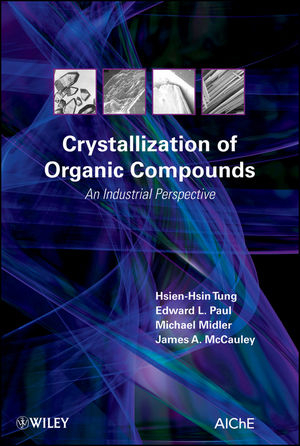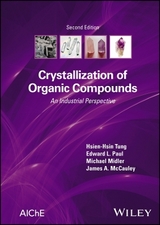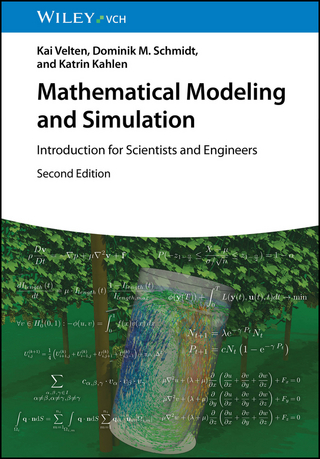
Crystallization of Organic Compounds
Wiley-AIChE (Verlag)
978-0-471-46780-9 (ISBN)
- Titel erscheint in neuer Auflage
- Artikel merken
Filled with industrial examples emphasizing the practical applications of crystallization methodologies Based on the authors' hands-on experiences as process engineers at Merck, Crystallization of Organic Compounds guides readers through the practical aspects of crystallization. It uses plenty of case studies and examples of crystallization processes, ranging from development through manufacturing scale-up. The book not only emphasizes strategies that have been proven successful, it also helps readers avoid common pitfalls that can render standard procedures unsuccessful.
The goal of this text is twofold:
Build a deeper understanding of the fundamental properties of crystallization as well as the impact of these properties on crystallization process development.
Improve readers' problem-solving abilities by using actual industrial examples with real process constraints.
Crystallization of Organic Compounds begins with detailed discussions of fundamental thermodynamic properties, nucleation and crystal growth kinetics, process dynamics, and scale-up considerations. Next, it investigates modes of operation, including cooling, evaporation, anti-solvent, and reactive crystallization. The authors conclude with special applications such as ultrasound in crystallization and computational fluid dynamics in crystallization. Most chapters feature multiple examples that guide readers step by step through the crystallization of active pharmaceutical ingredients (APIs). With its focus on industrial applications, this book is recommended for chemical engineers and chemists who are involved with the development, scale-up, or operation of crystallization processes in the pharmaceutical and fine chemical industries.
Hsien-Hsin Tung, PhD, was a senior investigator in Pharmaceutical Research & Development for Merck Research Laboratories until his retirement. Dr. Tung founded the Crystallization Laboratory in Chemical Engineering Research & Development, Merck Research Laboratories. Edward L. Paul, PhD, is retired director of Chemical Engineering Research & Development at Merck Research Laboratories. In addition to numerous patents and publications, Dr. Paul was coauthor of several chapters in, and senior editor of, the Handbook of Industrial Mixing: Science and Practice (Wiley). Michael Midler, PhD, is retired senior investigator, Chemical Engineering, with Merck Research Laboratories. His more recent patents and publications are primarily in processes for crystallization and the mixing of liquids. Dr. Midler coauthored, with Dr. Paul, "Mixing in the Fine Chemicals and Pharmaceutical Industries," in the Handbook of Industrial Mixing: Science and Practice. James A. Mccauley, PhD, was a senior investigator in the Analytical Research Department for Merck Research Laboratories until his retirement. After that, he served as an adjunct professor for the Pharmaceutical Engineering Training Program in the Department of Chemical and Biochemical Engineering at Rutgers University.
Preface. 1. Introduction to Crystallization Issues.
1.1 Crystal Properties and Polymorphism (Chapters 2 and 3).
1.2 Nucleation and Growth Kinetics (Chapter 4).
1.3 Critical Issues (Chapter 5).
1.4 Mixing and Crystallization (Chapter 6).
1.5 Crystallization Process Options (Chapters 7–10).
1.6 Special Applications (Chapter 11).
1.7 Regulatory Issues.
2. Properties.
2.1 Solubility.
2.2 Supersaturation, Metastable Zone, and Induction Time.
2.3 Oil, Amorphous, and Crystalline States.
2.4 Polymorphism.
2.5 Solvate.
2.6 Solid Compound, Solid Solution, and Solid Mixture.
2.7 Inclusion and Occlusion.
2.8 Adsorption, Hygroscopicity, and Deliquescence.
2.9 Crystal Morphology.
2.10 Particle Size Distribution and Surface Area.
3. Polymorphism.
3.1 Phase Rule.
3.2 Phase Transition.
3.3 Examples.
Example 3-1 Indomethacin.
Example 3-2 Sulindac.
Example 3-3 Losartan.
Example 3-4 Finasteride.
Example 3-5 Ibuprofen Lysinate.
Example 3-6 HCl Salt of a Drug Candidate.
Example 3-7 Second HCl Salt of a Drug Candidate.
Example 3-8 Prednisolone t-Butylacetate.
Example 3-9 Phthalylsulfathiazole.
3.4 Future Direction.
4. Kinetics.
4.1 Supersaturation and Rate Processes.
4.2 Nucleation.
4.3 Crystal Growth.
4.4 Nucleate/Seed Aging and Ostwald Ripening.
4.5 Delivered Product: Size Distribution and Morphology.
5. Critical Issues in Crystallization Practice.
5.1 Introduction.
5.2 Nucleation.
5.3 Growth.
5.4 Oiling Out, Agglomeration/Aggregation.
5.5 Seeding.
5.6 Rate of Generation of Supersaturation.
5.7 Summary of Critical Issues.
6. Mixing and Crystallization.
6.1 Introduction.
6.2 Mixing Considerations.
6.3 Mixing Effects on Nucleation.
6.4 Mixing Effects on Crystal Growth.
6.5 Mixing Scale-up.
6.6 Crystallization Equipment.
Example 6-1.
7. Cooling Crystallization.
7.1 Batch Operation.
7.2 Continuous Operations.
7.3 Process Design—Examples.
Example 7-1 Intermediate in a Multistep Synthesis.
Example 7-2 Pure Crystallization of an API.
Example 7-3 Crystallization Using the Heel from the Previous Batch as Seed.
Example 7-4 Resolution of Ibuprofen Via Stereospecific Crystallization.
Example 7-5 Crystallization of Pure Bulk with Polymorphism.
Example 7-6 Continuous Separation of Stereoisomers.
8. Evaporative Crystallization.
8.1 Introduction.
8.2 Solubility Diagrams.
8.3 Factors Affecting Nucleation and Growth.
8.4 Scale-up 171
8.5 Equipment.
Example 8-1 Crystallization of a Pharmaceutical Intermediate Salt.
Example 8-2 Crystallization of the Sodium Salt of a Drug Candidate.
9. Antisolvent Crystallization.
9.1 Semibatch Operation.
Example 9-1 Crystallization of an Intermediate.
Example 9-2 Rejection of Isomeric Impurities of Final Bulk Active Product.
Example 9-3 Crystallization of a Pharmaceutical Product with Poor Nucleation and Growth Characteristics.
Example 9-4 Impact of Solvent and Supersaturation on Particle Size and Crystal Form.
9.2 In-Line Mixing Crystallization.
Example 9-5 Crystallization of an API Using Impinging Jets.
Example 9-6 Crystallization of a Pharmaceutical Product Candidate Using an Impinging Jet with Recycle.
10. Reactive Crystallization.
10.1 Introduction.
10.2 Control of Particle Size.
10.3 Key Issues in Organic Reactive Crystallization.
10.4 Scale-up.
Example 10-1 Reactive Crystallization of an API.
Example 10-2 Reactive Crystallization of an Intermediate.
Example 10-3 Reactive Crystallization of a Sodium Salt of an API.
Example 10-4 Reactive Crystallization of an API.
10.5 Creation of Fine Particles—In-Line Reactive Crystallization.
11. Special Applications.
11.1 Introduction.
11.2 Crystallization with Supercritical Fluids.
11.3 Ultrasound in Crystallization.
11.4 Computational Fluid Dynamics in Crystallization.
Example 11-1 Sterile Crystallization of Imipenem.
Example 11-2 Enhanced Selectivity of a Consecutive-Competitive Reaction by Crystallization of the Desired Product During the Reaction.
Example 11-3 Applying Solubility to Improve Reaction Selectivity.
Example 11-4 Melt Crystallization of Dimethyl Sulfoxide.
Example 11-5 Freeze Crystallization of Imipenem.
Example 11-6 Continuous Separation of Stereoisomers.
11.5 Strategic Considerations for Development of a New Crystallization Process.
References.
Index.
| Erscheint lt. Verlag | 3.7.2009 |
|---|---|
| Sprache | englisch |
| Maße | 184 x 260 mm |
| Gewicht | 680 g |
| Themenwelt | Naturwissenschaften ► Chemie |
| ISBN-10 | 0-471-46780-4 / 0471467804 |
| ISBN-13 | 978-0-471-46780-9 / 9780471467809 |
| Zustand | Neuware |
| Informationen gemäß Produktsicherheitsverordnung (GPSR) | |
| Haben Sie eine Frage zum Produkt? |
aus dem Bereich



